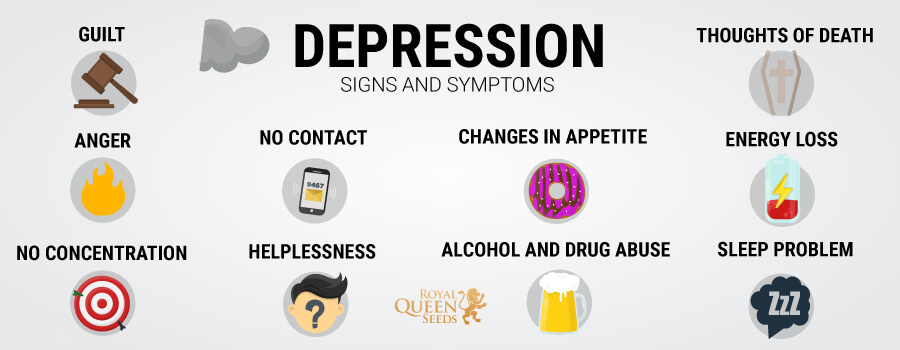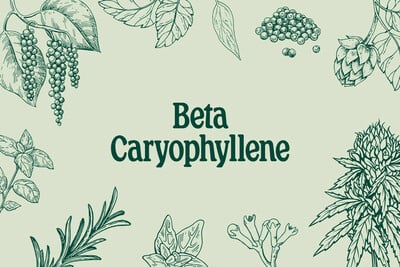.

The Research on CBD and Depression
Although depression has many contributing factors, neurochemical imbalance remains a prevalent cause. Researchers are now looking to pinpoint how CBD interacts with the ECS, in search of a means to influence this system in models of depression.
According to the World Health Organization, 25% of Europeans suffer from depression or anxiety each year. In the US, it is estimated that in 2015, at least 16.1 million adults over the age of 18 had at least one depressive episode. Depression is typically treated with antidepressants like selective serotonin reuptake inhibitors (SSRIs), and antipsychotic drugs.
While these medications work for some people, they aren’t a panacea. Scientists are looking for other sources of drugs to tackle the malady, including those within the cannabis plant.
WHAT IS DEPRESSION?
Regardless of its cause, the symptoms of depression are often quite similar. It is characterised by the dampening of mood, loss of motivation, loss of interest, loss of energy, disturbed sleep, and restlessness. Depression also comes with mental problems like loss of concentration and a reduced ability to think. Depression is a major risk factor for suicide and self-harm, substance abuse, and poor health outcomes.
Depression often gets simplified as a neurochemical imbalance and is treated as such. However, many scientists believe that neurochemical deficiencies are a symptom, rather than a cause of depression. As such, many doctors and researchers have turned their attention to prevention and minimising causes or triggers.
CAN CBD CURE DEPRESSION?
No. However, it has shown significant promise in treating depression. The human body produces its own cannabinoids, called endocannabinoids, aided by the consumption of fatty acids found in foods like fish, nuts, and seeds. Studies show that CBD is capable of interacting with the body’s endocannabinoid system. The endocannabinoid system is a network of cell receptors and molecules that help to regulate human functions like mood, appetite, and sleep. By binding to specific receptors in the human brain, endocannabinoids augment the action of serotonin, a neurochemical that improves mood and relieves stress.
CBD AND DEPRESSION: A LOOK AT THE RESEARCH
Cannabis scientists are trying to figure out how CBD impacts the mood, the central nervous system, and neurotransmission. So far, they’ve discovered some interesting mechanisms, including the cannabinoid’s proposed ability to “hack” the ECS.
Studies are currently analyzing the influence of CBD on circulating endocannabinoids and how it works to temporarily disable enzymes[1] responsible for their degradation. Researchers are particularly interested in investigating how the cannabinoid interacts with fatty acid amide hydrolase (FAAH). This enzyme breaks down anandamide (the “bliss molecule”), the brain chemical associated with positive psychological implications associated[2] with the “runner’s high”.
In their search for cellular targets, researchers have also observed an interaction between CBD and serotonin receptors. You’ve probably heard of serotonin, or the “happy hormone”. This neurotransmitter stabilises mood and contributes to feelings of well-being; low levels of the hormone are also associated with depression. Upon determining CBD’s potential to activate serotonin receptors[3] in vitro (cell studies), researchers are keen to find out how it works in animals.

Research in this area continues to unfold. A comparative study published in the British Journal of Pharmacology tested CBD in a mouse model of depression[4], comparing its effects against the tricyclic antidepressant imipramine. Further research, published in Neuropharmacology, set out to assess the impact of CBD[5] on serotonin and glutamate (the excitatory neurotransmitter) in mice.
Another paper, authored by researchers at the University of British Columbia in Canada, states that dysfunction in ECS signalling may give rise to a depressive phenotype, and that the system poses a potential target in the treatment of depression.
WHAT ABOUT TERPENES?
Terpenes are the aromatic molecules that underpin the signature scent of each cannabis cultivar. As well as contributing to the sensory delight of the herb, they also synergise with cannabinoids and directly influence the effect of each cultivar. Some research shows that terpenes even bind to cannabinoid receptors[6], and ongoing studies are probing them to determine their antidepressant potential.
The terpene and cannabinoid beta-caryophyllene (one of the most prevalent terpenes in cannabis) has garnered particular interest, partially because it’s been observed to bind with CB2 receptors of the ECS. Ongoing studies are exploring how it influences stress[7] and depression in animal models.
Medical DisclaimerInformation listed, referenced or linked to on this website is for general educational purposes only and does not provide professional medical or legal advice.
Royal Queen Seeds does not condone, advocate or promote licit or illicit drug use. Royal Queen Seeds Cannot be held responsible for material from references on our pages or on pages to which we provide links, which condone, advocate or promote licit or illicit drug use or illegal activities. Please consult your Doctor/Health care Practitioner before using any products/methods listed, referenced or linked to on this website.
- https://www.ncbi.nlm.nih.gov/pmc/articles/PMC3316151/
- https://journals.biologists.com/jeb/article/215/8/1331/11332/Wired-to-run-exercise-induced-endocannabinoid
- https://www.researchgate.net/profile/Ethan-Russo/publication/7507851_Agonistic_Properties_of_Cannabidiol_at_5-HT1a_Receptors/links/02e7e518a5fb6f1904000000/Agonistic-Properties-of-Cannabidiol-at-5-HT1a-Receptors.pdf
- https://pubmed.ncbi.nlm.nih.gov/20002102/
- https://pubmed.ncbi.nlm.nih.gov/26711860/
- https://www.nature.com/articles/s41598-021-87740-8
- https://pubmed.ncbi.nlm.nih.gov/31862467/










































